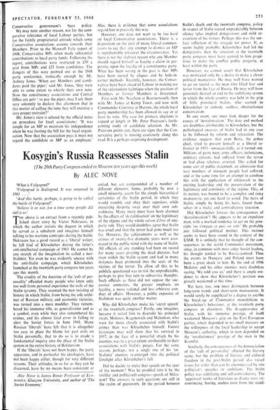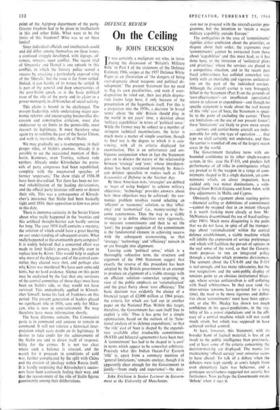Kosygin's Russia Reassesses Stalin
(The 20th Party Congress ended in Moscow ten years ago this week)
By ALEC NOVE
'What is Volgograd?'
'Volgograd is Stalingrad. It was renamed in 1961 . .
'And this battle, perhaps, is going to be called the battle of Volgograd?'
'Believe it or not, for a time some people did call it so.'
THE above is an extract from a recently pub- fished short story by Victor Nekrasov, in which the author revisits the dugout in which he served as a subaltern and imagines himself talking to his wartime comrades during the battle. Nekrasov has a good record as a 'liberal' writer; he fell foul of Khrushchev during the latter's anti-intellectual campaign of 1963. He cannot by any stretch of the imagination be called a neo- Stalinist. Yet even he was evidently uneasy with the anti-Stalin campaign, which Khrushchev launched at the twentieth party congress ten years ago this month.
The crudity of the doctrine of the 'cult of per- sonality' offended many people who knew only too well from personal experience the evils of the Stalin tyranny. They resented the new twisting of history in which Stalin, from being the sole archi- tect of Russian military and economic victories, was turned into a mere muddler. They remem- bered his immense role, as generalissimo and as a symbol, even while they also remembered his crimes, and his almost fatal error in failing to alert the Soviet forces in June 1941. Many Russian 'liberals' have felt that it is altogether too easy to place the blame for past evils on Stalin personally, that to do so is to evade a fundamental inquiry into the place of the Stalin system in the entire history of Bolshevism.
If the 'liberals' have not been happy, the party apparatus, and in particular the ideologists, have not been happy either, though for very different reasons. Their attitudes, in so far as they can be discerned, have by no means been consistent or Alec Nove is James Bonar Professor of Eco- nomics, Glasgow University, and author of 'The Soviet Economy.' united, but are compounded of a number of different elements. Some, probably by now a small minority, yearn for the simple hierarchical certainties of the Stalin period, in which they would tremble and obey their superiors, while exercising despotic sway over their own sub- ordinates. Many more must have been alarmed by the effects of 'destalinisation' on the legitimacy of the regime and the whole raison d'etre of one- party rule. They would doubtless agree that Stalin was cruel and that the terror had gone much too far. However, the achievements as well as the crimes of twenty-five dramatic years were asso- ciated in the public mind with the name of Stalin. All officials of any standing had been on record for many years praising the dead dictator, had risen within the Stalin system and had in many instances been promoted into the seats of the victims of the terror. To allow all this to be publicly questioned was to risk the unpredictable, perhaps to give free rein to subversive thoughts. Such officials as these did not oppose the suc- cessive amnesties, the greater emphasis on legality, a more rational and less arbitrary con- duct of affairs. However, a public exposure of Stalinism was quite another matter.
Why did Khrushchev make his 'secret speech' at the twentieth congress? Partly, one imagines, because it suited him to discredit his principal rivals, Molotov, Kaganovich and Malenkov, who were far more closely associated with Stalin's crimes than was Khrushchev himself. Future historians may well show that his survival in 1957, in the face of a powerful attack by his enemies, was to a great extent attributable to their associations with Stalin's purges. For the same reason, perhaps, not a single one of his `ex- Stalinist' enemies re-emerged into the political limelight after Khrushchev's fall.
Did he decide to make that speech on the spur of the moment? Was he prodded into it by the (milder and publicised) congress speech of Miko- -yan? The answers to such questions are stilt in the realm of guesswork. In the period between
Stalin's death and the twentieth congress, policy in respect of Stalin veered unpredictably between silence (plus implied denigration) and mild re- assertion of his virtues. Perhaps this was the sur- face reflection of the struggle for power. lf, as seems highly probable. Khrushchev had led the denigrators. then the situation at the twentieth party congress must have seemed to him propi- tious to make the conflict public property, at least within the party.
However, we cannot assert that Khrushchev was motivated only by a desire to make a clever political manoeuvre. He may well have wanted to go on record as the man who lifted fear and terror from the face of Russia. He may well have genuinely desired an end to the stultifying system in which the whole country was held in the grip of little provincial Stalins, who seemed to Khrushchev to embody soulless, obstructionist conservatism.
In any event, one must look deeper for the causes of `destalinisation.' The date and method are doubtless attributable to Khrushchev, but the pathological excesses of Stalin had in any case to be followed by reform and relaxation. The evidence suggests that even Beria, the police chief, tried to present himself as a liberal re- former in 1953—unsuccessfully, as it turned out. Millions of party men, army officers, technicians, ordinary citizens, had suffered from the terror or had close relatives arrested. This called for some sort of public statement, an admission that vast numbers of innocent people had suffered, and at the same time for an attempt to combine this with the application of whitewash to the existing leadership and the preservation of the legitimacy and continuity of the regime. This, of its nature, was bound to be a complex and risky manoeuvre, yet one hard to avoid. The heirs of Stalin, simply by being his heirs, found them- selves in a tricky and contradictory situation.
Did Khrushchev foresee the consequences of `destalinisation'? He appears to be an impulsive man, with a marked tendency to act on the prin- ciple 'on s'engage et pals on wit.' He probably just followed political instinct. This instinct seems to have been sound in the context of the USSR. It is unlikely that he thought of the con- sequences to the world Communist movement, since, in common with most other Soviet leaders, his thought tended to be Russia-centred. Thus the events in Hungary and Poland must have been a great shock to him. By the end of 1956 Molotov and his other enemies were doubtless saying, 'We told you so,' and there is ample evi- dence to show that Khrushchev's position was gravely weakened at this time.
Yet here, too, one must distinguish between long-term trends and short-term manoeuvres. It would surely be superficial to a degree to ascribe the break-up of Communist monolithism to Khrushchev's behaviour, at the twentieth party congress or elsewhere. The disappearance of Stalin, with his immense prestige, of itself weakened Moscow's grip on the East European parties. which depended in no small measure on the willingness of the local leadership to accept Moscow's authority, which in turn depended on the 'revolutionary' prestige of the man in the Kremlin.
Similarly, the consequences of the denunciation of the 'cult of personality' affected the literary scene, but the problem of literary and cultural freedom in the post-Stalin period also raised issues far wider than can be encompassed by one politician's speeches or ambitions. The Stalin policy was stultifying and self-contradictory. The 'approved' works of literature or drama were un- convincing, boring, useless even from the stand-
point of the Agitprop department of the party. Greater freedom had to be given to intellectuals in this and other fields. What were to be the limits of this freedom? Who was to set these limits?
Since individual officials and intellectuals could and did differ among themselves on these issues, a confused struggle developed, with zigzags, ad- vances, retreats, open conflict. The recent trial of Sinyaysky and Daniel is one episode in this conflict, in which the literary police scored a success by attacking a particularly exposed wing of the 'liberals,' but the issue is far from settled. Indeed, it can hardly of its nature be settled. It is part of the general and deep uncertainties of the post-Stalin epoch, as is the basic political issue of the role of the party and its claim to a power monopoly in all branches of social activity.
This claim is bound to be challenged. The present leadership, while undertaking major eco- nomic reforms and encouraging businesslike dis- cussion and constructive criticism, must also endeavour to set limits to the permissible, must reassert its legitimacy. It must therefore once again try to redefine the past of the Soviet Union, and with it, inevitably, the rOle of Stalin.
We may gradually see a re-emergence, in their proper roles, of Stalin's enemies. Already it is possible to see the occasional mention of Buk- harin, Kamenev, even Trotsky, without rude epithets. Already under Khrushchev the proto- cols of party congresses had been republished, complete with the uncensored speeches of former 'unpersons.' The show trials of 1936-38 have been discredited. Yet there has been no for- mal rehabilitation of the leading deviationists, and the official party histories still omit or distort their role. This was a consequence of Khrush- chev's insistence that Stalin had been basically right until 1934; their opposition to him was prior to this date.
There is immense curiosity in the Soviet Union about what really happened in the 'twenties and this artificial thought-barrier can hardly survive for long. The year 1934 itself contains a mystery, the solution of which could have a great bearing on our understanding of subsequent events. What really happened at the seventeenth party congress? It is widely believed that a concerted effort was made to limit Stalin's powers, possibly even to replace him by Kirov. This would help to explain why most of the delegates and of the central com- mittee they elected were shot, and perhaps also why Kirov was murdered. We have seen some odd hints,. but no hard evidence. Silence on this point may be explained by the fact that any survivors of the central committee of those days must have been on Stalin's side, or they would not have survived. This undoubtedly applied to Khrush- chev himself; hence his lack of frankness on this period. The present generation of leaders played no significant rOle in 1934, save only for Miko- yan, who is now in semi-retirement. We may therefore have more information shortly.
The basic dilemma remains. The Communist party is in command and anxious to remain in command. It will not tolerate a historical inter- pretation which casts doubt on its legitimacy. It desires to take credit for the achievements of the Stalin era and to divest itself of responsi- bility for the crimes. It is not too clear where such a balance is situated, and the search for it proceeds in conditions of cold war, further complicated by the split with China and the erosion of ideology within Russia itself. It is hardly surprising that Khrushchev's succes- sors have been cautiously feeling their way, and that the reassessment of the role of Stalin figures prominently among their deliberations.



































 Previous page
Previous page